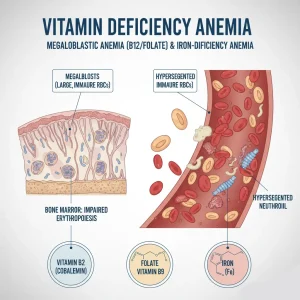Overview
Diagnosis
To diagnose vitamin deficiency anemia, your healthcare professional will likely order blood tests to identify which vitamins are lacking and how your red blood cells are affected. These tests may include:
-
Checking the number and appearance of red blood cells
-
Measuring the amount of vitamin B-12 and folate in the blood
-
Testing for antibodies to intrinsic factor, which indicate pernicious anemia
These results help determine the type and cause of the deficiency so that the right treatment plan can be made.
Treatment
Treatment for vitamin deficiency anemia focuses on restoring normal vitamin levels in the body. The approach depends on which vitamin is lacking and the cause of the deficiency.
For pernicious anemia, vitamin B-12 is usually given through injections. Many people need to continue these injections for life to prevent symptoms from returning.
Vitamin B-12 can be provided as:
-
Injections into a muscle or under the skin
-
Pills taken by mouth
-
Tablets or liquids that dissolve under the tongue
-
Nasal gels or sprays
To treat folate deficiency, folic acid is usually prescribed in pill form. In some cases, folic acid may be given through an intravenous (IV) line.
Preparing for your appointment
Start by seeing your primary healthcare professional, who may refer you to a hematologist, a doctor who specializes in blood disorders.
Here’s how to prepare for your appointment:
-
Make a list of your symptoms and when they began
-
Note any other medical conditions you have
-
Write down all medicines, vitamins, and supplements you take, including doses
-
Prepare questions to ask your healthcare professional
Common questions to consider include:
-
What’s the most likely cause of my symptoms?
-
What other conditions could be causing them?
-
Will my condition go away or is it lifelong?
-
What treatment do you recommend?
-
How can I manage this condition alongside other health issues?
-
What foods should I add to my diet?
-
Where can I find more information about vitamin deficiency anemia?
What to expect from your doctor
Your healthcare professional may ask you questions such as:
-
How severe are your symptoms?
-
Does anything make your symptoms better or worse?
-
Are you a vegetarian or vegan?
-
Do you drink alcohol? If so, how often and how much?
-
Do you use tobacco products?
Answering these questions openly will help your doctor determine the cause of the deficiency and design the most effective treatment plan for your health.
Advertisement

